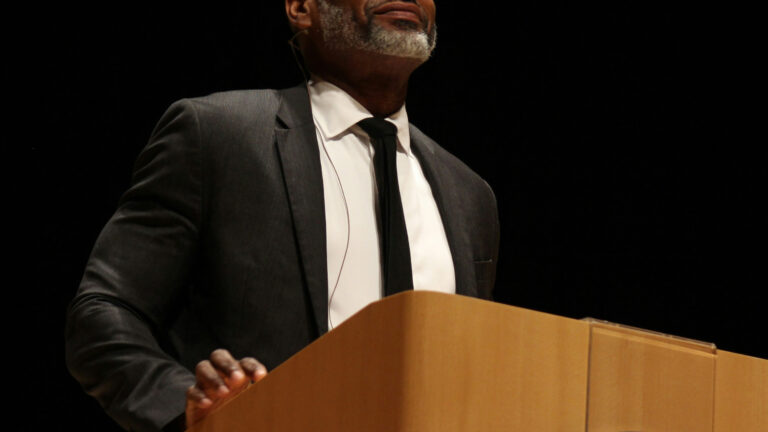We begin our Christian journey by faith and live by faith. As we are continuously transformed into the image of Jesus Christ, we become conduits of his precious gifts of grace, love and mercy in our actions—how we think, how we speak, how we act. Therefore our actions – thoughts, words and deeds – are an integral part of who we are as followers of Jesus Christ. How we treat other people (or as Jesus calls them “the least of these, my brothers”) is a clear sign of our spiritual development.
Our actions – thoughts, words and deeds – are an integral part of who we are as followers of Jesus Christ
Faith Without Works Is Dead
By their fruits you will know them, Jesus said. (Matt 7:16) Or, as James put it, “What good is it, my brothers, if someone says he has faith but does not have works? Can that faith save him? If a brother or sister is poorly clothed and lacking in daily food, and one of you says to them, “Go in peace, be warmed and filled,” without giving them the things needed for the body, what good is that? So also faith by itself, if it does not have works, is dead.” (James 2:14-17).
Jesus On the Day of Judgement
In Matthew 25:31-46 Jesus talks about what will happen at the final judgment. “When the Son of Man comes in his glory, and all the angels with him, then he will sit on his glorious throne. Before him will be gathered all the nations, and he will separate people one from another as a shepherd separates the sheep from the goats. And he will place the sheep on his right, but the goats on the left.”
Jesus gives the reason why some will go to the right, “For I was hungry and you gave me food, I was thirsty and you gave me drink, I was a stranger and you welcomed me, I was naked and you clothed me, I was sick and you visited me, I was in prison and you came to me.”
I was a stranger and you welcomed me, I was naked and you clothed me, I was sick and you visited me
Did You Love Your Neighbour?
The righteous, those on the right, will respond: “Lord, when did we see you hungry and feed you, or thirsty and give you a drink? And when did we see you a stranger and welcome you, or naked and clothe you? And when did we see you sick or in prison and visit you?” Jesus’ answer, “Truly, I say to you, as you did it to one of the least of these my brothers, you did it to me.”
We are told that he will then turn to those on his left and say, “Depart from me, you cursed, into the eternal fire prepared for the devil and his angels. For I was hungry and you gave me no food, I was thirsty and you gave me no drink, I was a stranger and you did not welcome me, naked and you did not clothe me, sick and in prison and you did not visit me.”
We are called to be Jesus’ hands and feet, not merely mouth pieces
Similarly to those on the right, those on the left will ask: “Lord, when did we see you hungry or thirsty or a stranger or naked or sick or in prison, and did not minister to you?” Jesus will answer them, “Truly, I say to you, as you did not do it to one of the least of these, you did not do it to me.” Then, finally, is the judgment. “These (those on the left) will go away into eternal punishment, but the righteous (those on the right) into eternal life.”
How Do You Treat “The Least of These”?
Looking at your own life, on which side will you find yourself?
- Do you welcome the stranger?
- Do you clothe the naked?
- Are you feeding the hungry?
- Do you visit the sick?
- Do you visit those in prison?
- Are you giving the thirsty a drink?
God calls us, as followers of Jesus, to be his hands and feet – not merely mouth pieces. He calls us to spread his practical love by feeding the hungry, giving a drink to the thirsty, clothing the naked, welcoming the stranger, visiting the sick and those in prison.
So what keeps us from doing exactly that? Why are so many around us left exposed to the elements? Why do so many sick and imprisoned people go without care?
Who is My Neighbour?
Do you remember the story of the good Samaritan (Luke 10:25-37)? It opens with a lawyer who wants to test Jesus. He does so by asking this question. “Teacher, what shall I do to inherit eternal life?” Jesus answers with two questions of his own, “What is written in the Law? How do you read it?” On point, the lawyer replies: “You shall love the Lord your God with all your heart and with all your soul and with all your strength and with all your mind, and your neighbour as yourself.” Jesus affirms his answer, “You have answered correctly; do this, and you will live.”
But then the lawyer asks another question, “Who is my neighbour?”
Jesus answers this question with the parable of the good Samaritan. What is important to note in the conversation above is that the lawyer was insincere. He set out to test Jesus. Jesus, well aware of the lawyer’s ill motives still answered him. In the end we are told, the lawyer sought to justify himself, which is why he asked the last question: “Who is my neighbour?”
Four Poor Excuses
The lawyer, together with the Levite and the Priest mentioned in the parable, illustrates the poor reasons (or excuses) offered for why we do not love our neighbours.
- We begin by getting into definition arguments: Who is my neighbour? How do you know they are genuinely hungry, thirsty, needy or sick?
- If we are honest, we do not want to be troubled. The problems of others can be bothersome.
- We are not genuine in our desire to serve others. Regularly, we serve with selfish reasons and motivation. Thus opportunities that do not serve our own interests are pushed aside.
- We are sure someone else will meet the needs of those in need. Unfortunately that is what everyone else is thinking: someone else will meet this need. This is why millions end up sleeping hungry, thirsty, outside, unwelcome, sick and imprisoned without care.
Who Are “The Least of These”?
The direction from our Lord is clear: “what you do to the least of these you did to me”. I would like to submit that in my understanding ‘the least of these’ extends to children. Every time there is a need for or breakdown in the provision of basic needs (food, water, healthcare, shelter, education, safety) poor children and women tend to suffer the most. Just consider the current COVID-19 pandemic.
Matthew Henry said, “It is sad when those who should be examples of charity are prodigies of cruelty, and when those who should by displaying the mercies of God, open the bowels of compassion in others, shut up their own.”
We are engrossed in speaking and optics. But we have forgotten mercy
Mercy And Justice Are Going Neglected
Many times as followers of Jesus, we have become enamoured with rules and regulations. We are engrossed in speaking and optics. But we have forgotten mercy. We have forgotten to feed, to clothe, to give a drink, to visit the sick and imprisoned. Mercy and justice go neglected. We have relegated it into a department within the church. It is a ministry for others, elsewhere.
Our Lord Jesus, on the other hand, lived an integrated life. He served and taught. While providing food to the hungry, visiting the sick and bereaved, consoling those who were mourning he taught.
We Must Stop Standing By
On the 17th of August, Kenyan media aired a shocking story. A man, with his children, was pushed out of his slum dwelling into the bush for 6 months. Why? For a lack of $15 rent. And this story is just one of the many that continue to degrade the lives of many within our communities.
My question is where was the church? I am not talking about the system or the structure. I mean the individuals. Men and women who claim to be under the lordship of Jesus. In allowing the ‘least of these’ to suffer such indignity while giving all sorts of excuses, we firmly take our place among the goats on the left hand side of the king on day of judgment.
Our Lord Jesus lived an integrated life. He served and taught
The good Samaritan we read about embodied the description of those people Jesus will put on his right. He came, he saw the need and he attended to it. “Therefore, since we are surrounded by so great a cloud of witnesses, let us also lay aside every weight, and sin which clings so closely, and let us run with endurance the race that is set before us, looking to Jesus, the founder and perfecter of our faith, who for the joy that was set before him endured the cross, despising the shame, and is seated at the right hand of the throne of God” (Hebrews 12:1-2).












